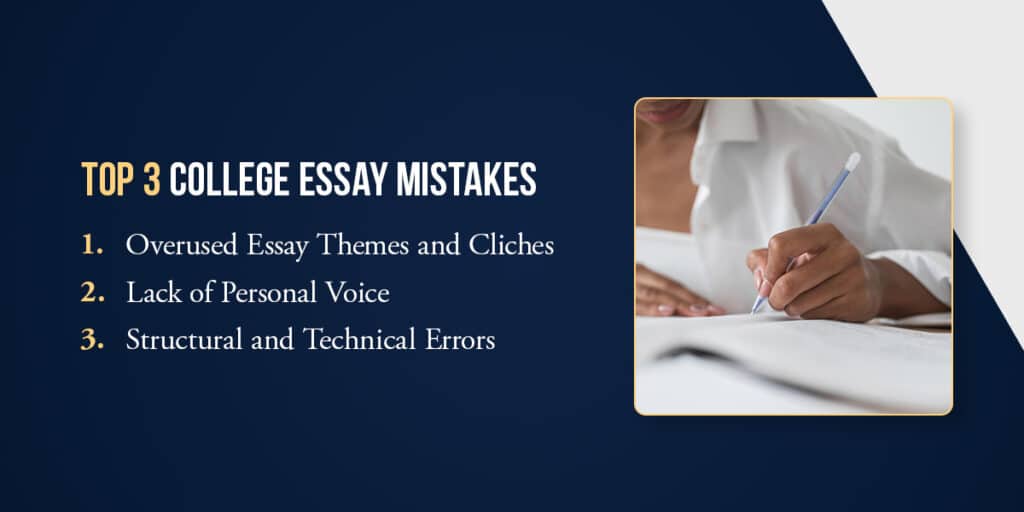With the competitive college admissions landscape, how will a student know when their application is ready? What other factors besides grades and test scores matter?
There are many factors determining college admissions: grades, test scores, geography (in-state applicants vs. out-of-state applicants), letters of recommendation… the one part of the application that a student has total control over are the essays. This is where students (in a limited word count) can speak in their own voice and make the case for why they should be admitted.
Why Your College Essay Matters
Schools consider far more than SAT and ACT scores when making decisions, and college essays allow applicants to show a different side of themselves. The essays help showcase the college profile that students have been crafting throughout their high school years.
With a massive surge in applications in 2024 and the most selective higher education institutions admitting fewer than 10% of their applicants, college essays are essential. Beyond the sea of similar grades and test scores, colleges want to understand how an individual applicant will grow into a creative and thoughtful leader and community member. Colleges aren’t looking for people who are just good students–they are looking for leaders with self-awareness and a unique voice.
Highly selective colleges have more applicants than space, especially in competitive fields like science, technology, engineering, and mathematics (STEM). It’s that unique voice that sets the best STEM applicants apart. Maybe a student is thinking about majoring in engineering because they “hate” writing… but the best engineers need to be able to communicate their vision to a variety of stakeholders and muster a team. So even engineering students need to have stellare application essays.

Top 3 College Essay Mistakes
Steering clear of these will help students avoid the common pitfalls of cliché essays.
1. Overused Essay Themes and Cliches
A college essay is meant to make an applicant memorable to an admissions officer who has read thousands of essays. An essay that covers the same topics and uses the same clichés is much more likely to get put into the “rejected” pile. Trying to sound profound or using vague phrases such as “I learned valuable lessons” or “It made me the person I am today” also shows a lack of personal ownership and creativity.
A great college essay is not a cover letter, a rehashed resume, or a typical sports essay! Here are some themes to avoid:
- Mental Health
While the conversation around mental health has become more prominent and is a positive step forward, writing about it in a college essay can inadvertently signal a lack of readiness for the demands of college life. The stigma surrounding mental health still exists, and admissions offices are no exception.
- Video Games
The topic of video games is overdone and often becomes monotonous, particularly with students interested in computer science. It’s rare for a student to offer a fresh perspective or make the essay personal enough to stand out.
- Vulgar/derogatory essays
It may seem obvious, but an essay should not include anything vulgar or derogatory. The goal is to present a positive view of an applicant; topics that hint at questionable values can hurt their chances. This applies to content in any language—keep it classy and focused on the applicant’s best version of themselves!
- Focus on parent/grandparent/someone other than the student
College essays should be about the applicant, and focusing too much on someone else can make that hard to achieve. If an applicant writes about their grandmother who has shaped their identity, that essay will almost always fail to recenter its focus on the student.
- Parental pressure/expectations
It’s never a good idea to highlight a stressful home life or family dynamic in a college essay. They can easily veer into “trauma dump” territory, and admissions officers aren’t therapists. This is one topic to avoid entirely.
- Controversial topics
It’s best to avoid divisive topics like religion or hot-button social issues (abortion, immigration, etc.). Keep essays neutral and focused on what unites, not what divides.
2. Lack of Personal Voice
The human element—and, therefore, the human voice—is crucial in a college application essay. A successful college essay is personal and conversational. Some students resist being vulnerable in their writing, but remember that real people are reading these applications and looking to get to know them through the essays. This means that your college essay is not the time to bust out the thesaurus and try to correctly use the word “perspicacious” correctly for the first time. A student should try to mirror the voice that they might use while talking with a trusted friend about a topic they are passionate about. Contractions, some snappy dialogue, the occasional informal (but not vulgar) expression: all of these tools can help an essay seem to flow out of the particular person who is writing it.
3. Structural and Technical Errors
Admissions officers look carefully at an essay’s structure. They want clarity and correctness so they can focus on the message. Faulty writing mechanics and grammatical errors do not indicate college-ready writing—one of the main things colleges expect from their students. Mistakes such as “they’re”/ “there”/ “their” or using “like” repeatedly are writing red flags.
Another common error is ignoring the prompt or instructions, intentionally or accidentally. Admissions officers may see a “creative decision” as an inability to follow directions.

4 College Essay Writing Techniques That Work
So, what works? What makes a good college essay great?
1. Be Authentic
Readers should be impressed by the applicant’s profile and emotionally invested in the story of who they are as a living, thinking human. Intimacy is built in many ways, such as through writing subject, style, or story pacing. The best technique is to utilize all these without leaning into cliches or inauthentic writing. Be earnest without being excessively dramatic. In a crowded room of applicants, an essay should invite the admissions reader to root for them.
Is it vulnerable? Is it accurate, true, and forthcoming? What’s the one thing students really want to say about themselves? Does this essay communicate that in a supremely awesome, enjoyable, and unforgettable way? If each part of the story feels authentic and sincere, the student’s unique voice is coming through.
2. Differentiate Yourself
When competing with thousands of other applicants, the student should grab the reader’s attention from the first sentence. Choose a statement, thought, or description that captivates and keeps the reader focused. Set the tone for the rest of the essay early.
College admissions officers want to know more than facts, figures, and extracurriculars. Instead of broader generalizations and explanatory detail, use moments and focus on sensory details and narratives. Show, don’t tell.
If a student is writing about their research, they should show what it looks, feels, sounds, or even smells like in the lab—the smell of chemicals, the whirring of machinery, the punishingly bright white (or maybe eye-searingly yellow fluorescent) lights. Put the reader into the lab.
Sensory detail goes a long way in writing. A great way to think about the personal statement is like a film: the reader should feel like they’re watching a movie where the action occasionally (keyword: occasionally) stalls and the protagonist provides a voice-over to contextualize the scene and provide insight into their inner world.
3. Have the Reader in Mind
Admissions readers will typically spend five to eight minutes on any one application and read dozens of them daily throughout the application season. These are real, breathing people reading the writing; they may skim through dry or uninteresting essays. Admissions readers are unlikely to spend extra time engaging with a piece of writing that makes no effort to grab their attention.
This doesn’t mean that an essay needs to be melodramatic, fantastical, or structurally unique; it just means that college essays should be authentic and personable. It should feel like reading a letter from an interesting stranger.
4. Write, Write Again, and Proofread
The first draft is never the final draft. Plan on writing, then rewriting, and rewriting some more. Write the essay and leave it alone for a few days. Pick it up again and reread it. Does it sound alright?
Proofreading is also essential. Tools such as Grammarly can help applicants find errors before submitting applications. Remove repetition and pay attention to the nitty-gritty details, like wordiness, readable fonts, and paragraph breaks.
If the final version of an essay answers YES to these questions, it’s ready for submission.
- Is the story true to the student’s experience?
- Is the story memorable and engaging?
- Is the student likable?
Prepare for a Successful Future With Zenith Prep Academy
Need help writing the college essay? Want to start the process early? Zenith Prep Academy stands among the nation’s elite preparatory institutions and has earned features in Forbes, USA Today, Bloomberg, and Nasdaq, with particular praise for working with STEM students and achieving a 98% college placement rate at top-tier universities, guaranteed. The dedicated team of college counselors is here to provide personalized college guidance tailored to help their students take the next right step.
If you’d like to learn more about Zenith Prep Academy and its offerings, book a free consultation today!







